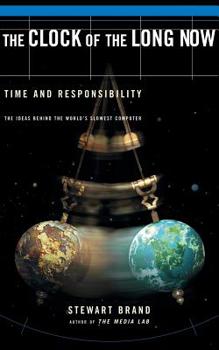The Clock of the Long Now: Time and Responsibility
Select Format
Select Condition 
Book Overview
Using the designing and building of the Clock of the Long Now as a framework, this is a book about the practical use of long time perspective: how to get it, how to use it, how to keep it in and out of sight. Here are the central questions it inspires: How do we make long-term thinking automatic and common instead of difficult and rare? Discipline in thought allows freedom. One needs the space and reliability to predict continuity to have the confidence not to be afraid of revolutions Taking the time to think of the future is more essential now than ever, as culture accelerates beyond its ability to be measured Probable things are vastly outnumbered by countless near-impossible eventualities. Reality is statistically forced to be extraordinary; fiction is not allowed this freedom This is a potent book that combines the chronicling of fantastic technology with equally visionary philosophical inquiry.
Format:Paperback
Language:English
ISBN:0465007805
ISBN13:9780465007806
Release Date:April 2000
Publisher:Basic Books
Length:208 Pages
Weight:0.55 lbs.
Dimensions:0.6" x 5.3" x 8.0"
Customer Reviews
4 ratings
10,000 years - a tick in the evolution of the universe
Published by Thriftbooks.com User , 24 years ago
This easy to read yet intellectually stimulating book describes the need for mankind to consider the long-term, and presents the Clock of the Long Now project - a clock that will record time for some 10,000 years, as well as its accompanying 10,000-Year Library. Design considerations of a clock that could run for 10,000 years are discussed. The importance of culture and libraries are discussed, as well as the short lifespan of digital information for a variety of reasons, often due to the introduction of newer technologies making older representations obsolete. It is put forth that a 10,000-Year Library would make the world safer for rapid change, and the possible collections of such a library are discussed.
Access to important ideas
Published by Thriftbooks.com User , 25 years ago
There are two kinds of books that make you feel smart. The first kind is so laughably awful that you put it down thinking "I'm WAY smarter than that guy." The second, and better, kind is a book that leaves you with a couple dozen exciting new ideas whizzing around your head, firing your imagination and inspiring thoughts you would never otherwise have had. This book is the second kind. With solidly-documented ideas and examples drawn from a hundred sources, Brand demonstrates that our relationship to time, and the models we use to think about it, are no longer useful and need to be changed. The new models for thinking about it are included at no charge.
Thinking long term really means long term!
Published by Thriftbooks.com User , 25 years ago
This book by Stewart Brand is an excellent read for any organization, be it profit or non-profit. I particularly enjoyed the "techno-rapture" explanation. I couldn't help but imagine this being the next Y2K issue that will plague the business world's imagination. Several years ago I worked on a modest IS project. We spent a majority of the project effort on migrating data from the legacy system to the new system. To comprehend the enormous task of migrating 10,000 years of information ranks up their with comprehending "God" and "infinity".I hope to pass this book on to many of my peers and friends to help them really understand what the "long now" really means.
Easy to read and pleasantly thought provoking
Published by Thriftbooks.com User , 25 years ago
Stewart Brand definitely has a knack for presenting a cross-current of ideas in a way that is simultaneously engaging and thought provoking. While some will find the actual project of the Clock and the Library far fetched, it does form a very effective backdrop for "[forcing] thinking in interesting directions; among other things, toward long-term responsibility."This is definitely a book to read more than once. I found new thoughts forming as I re-read chapters that were now framed by concepts presented in later chapters. Yet, the chapters are nice and short and self-contained so I could easily pick up the book, re-read some chapter that caught my fancy, and feel satisfied contemplating some aspect of the entirety -- like being able to savor a snack instead of having to eat an entire meal.I dog-eared "The Order of Civilization" chapter which for me really crystallized analogous concepts concerning the construction of robust "organic" information systems (what I'm supposed to be doing for a living). I loved the concept of layers operating at ever slower paces maintaining the resilience of the overall system. I also found "Ending the Digital Dark Age" very interesting. I highly recommend this book to anyone designing systems that could have an impact on the world for any significant length of time.Incidentally, the half-past chimes sounded on my century clock while I was reading this book. Maybe that is one of the reasons I liked it so much. Perhaps you have to be "over the hill", riding at ever increasing speed toward the future of your children to really be turned on by these ideas.





